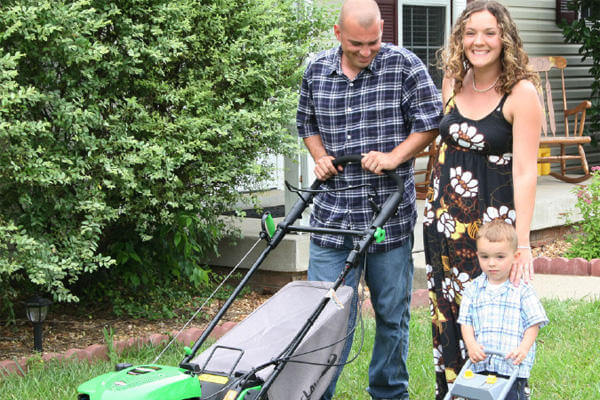Emotional Distancing
The deployment experience can be particularly taxing on personal relationships. Pre-deployment presents its own unique challenges, as this is the time when servicemembers and their families are anticipating and preparing for the deployment, often with little clarity on specifics of the deployment. While nearly all servicemembers find this time hectic as their units engage in extensive training and unit preparation, some servicemembers end up focusing more on bonding with their colleagues than on connecting with their partners or spouses. In these cases, the servicemember may be emotionally and physically distancing himself or herself from his or her loved ones in order to make leaving easier. The spouse, partner, or loved ones might also employ the same strategy for the same reason.
"I begin to detach. By that, I mean that I start to live my day-to-day life as if he is already gone and do things on my own."
—Navy spouse
Some spouses resist or resent the emphasis on the unit rather than on their own relationship, while other spouses find themselves equally preoccupied with finding and creating relationships that will help them deal with their servicemember's absence.
For spouses and partners of servicemembers, it's normal to have concerns about how you'll remain connected to your servicemember when he or she is about to leave for a lengthy period of time. Will your relationship survive this separation? What happens if he is injured? Try to communicate with your spouse as much as possible during this time and remember that distancing is a natural tendency during the pre-deployment phase.
Pre-Deployment Tension
It's not a reflection of the quality of your relationship if you and your servicemember find this time challenging and tense. In fact, it's common for couples to have at least one major argument before the servicemember actually deploys. Consciously or unconsciously, some spouses find it easier to say goodbye if they're less connected to their servicemember emotionally.
"I try to be supportive to my spouse. They're more stressed than I am when it comes to preparation."
—Air Force spouse
On top of everything else, this is also when many couples need to get their legal, personal, banking, and housing affairs in order. Some of these activities can trigger a great deal of stress, particularly those issues relating to the possibility of the servicemember's injury, illness, or death. Here's where your network of extended family and friends is invaluable, so lean on them for support.
"We argued a lot. We picked fights with each other. I think part of me just wanted him to get emotional about leaving. I needed reassurance that I could press his buttons and that he would know how much his leaving was hurting me."
—Marine Corps spouse
It's important for your relationship that you try to carve out some special time together as a couple when you are engaged in activities unrelated to the nuts-and-bolts of the deployment. Here are a few ideas to decrease pre-deployment stress and strengthen your relationship:
Make Time To Connect
Establishing a sense of intimacy can sometimes be a challenge for couples as they prepare for the deployment. If you can make being together and being intimate a priority for you before the deployment, it can be easier to maintain that intimacy during the deployment. And if you foster that closeness during the deployment, it may be easier to reconnect emotionally when your servicemember returns.
"I try to spend as much time with my husband as I can. We try to just enjoy doing things together, rather than focusing on him deploying."
—Army spouse
If you have children, seek babysitting services so that you can spend a few hours together alone. Some couples reserve "date nights" as a regular part of their relationship. If you don't already do this, now would be a good time to start. Yes, babysitters are an added expense, but you can save money by working with neighbors and fellow spouses or by using the time to go for a walk or a less expensive restaurant.
"I cook him his favorite dinner, and we also make sure to have a date night, where we focus on being together."
—Army spouse
Some military installations offer pre-deployment couples classes. Find out whether your servicemember's unit is offering something similar. For National Guard/Reserve families, you may want to ascertain whether your unit's chaplain (or family readiness group) has made arrangements for any pre-deployment couples activities or marriage retreats. You can also refer to the resources chapter to find free military-specific marriage counseling resources, or you can look for family programs in your state either through branch-specific resources or your social network online. If nothing like this is available, consider a local marriage counselor, making it clear that the purpose of your sessions is to prepare for deployment in a healthy, constructive way.
Get Creative With Appreciation Exercises
Buy a digital recorder and use it to say what you and your partner appreciate about each other every day. The result is a priceless gift of 365 different recordings of your loved one's devotion. Buy stationery and cards so that when your spouse leaves you are prepared to start sending them letters and notes. Better yet, ask them to do the same! Emails are a wonderful addition to the way military families can communicate during deployments, but consider writing old-fashioned love letters as well. An extra bonus of a handwritten letter is that it makes wonderfully romantic artwork when framed!
"My husband bought a bunch of small presents and cards for me. He wrapped them all up and labeled them 'for when you are feeling sad' or 'need a break?' I got to open them throughout deployment. It was really nice to read the notes he'd written. They helped get me through the hard days."
—Air Force spouse
Express Your Love in Little Ways
Take time to remind one another that your love is strong. Human touch is a powerful tool for maintaining an emotional connection, so give each other baths, foot rubs, and body massages, and find any reason at all to hold hands or cuddle. Now is the time to build memories that both you and your servicemember can draw upon during the deployment.
|
Already Experienced a Deployment Cycle? Consider reaching out to a spouse who has never gone through a deployment before. She or he could probably benefit a great deal from your insight and perspective. NOTE: Do not overextend yourself. Remember, you should always tend to your own needs first. |
This excerpt is provided courtesy of the acclaimed free digital resource "Everyone Serves". Download your free copy with additional media content today at everyoneservesbook.com.





















